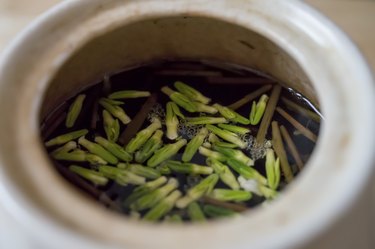
Lotus tea has been used for its health benefits for thousands of years. From antioxidant properties to acne-fighting effects, the sweet-scented lotus flower, along with the leaves, stem and root, a popular cooking ingredient, tout a number of advantages.
Overview on the Lotus Flower
Video of the Day
Nelumbo nucifera, known as the lotus, is a plant in the Nymphaeaceae family. According to a July - September 2014 paper in Pharma Science Monitor, the lotus goes by several names including the Indian lotus, Chinese water lily and sacred lotus.
Video of the Day
An article from August 2013 in Resonance explains that the lotus is the national flower of India, and is considered sacred. It's been in existence for millions of years and was cultivated more than 3,000 years ago to be used as food, medicine and for cultural and religious traditions.
In the Buddhist religion, for example, the lotus is placed at the shrine as a symbol of serenity. In China, the lotus seeds are regarded as a symbol of fertility. In rural regions of Bengal, lotus leaves are used as plates for religious ceremonies.
According to the article in Resonance, The lotus is also thought to have medicinal benefits, and has historically been used as astringents for a variety of ailments, and seeds have been used to suppress vomiting and alleviate certain skin diseases. Lotus honey has also been known to relieve common afflictions. However, there's little evidence to support these medicinal properties.
Lotus Leaf Benefits
A January 2013 review in the Indian Journal of Pharmaceutical and Biological Research names the many benefits of lotus based on the latest research. According to this review, lotus has been found to possess antioxidant and antiviral activity, as well as anti-inflammatory effects and anti-obesity activity. It also has cardiovascular and anti-bacterial benefits.
The lotus leaf in particular is used in a juice form for the treatment of diarrhea. Leaf extract is used to help stop bleeding and to treat sweating, says a 2015 review in Evidence-Based Complementary and Alternative Medicine.
Moreover, there have been studies pointing to the skin benefits of the lotus plant. One August 2013 study in the journal, Hippokratia, with a small sample size of 22 participants, found that when applied to the face, lotus extract can reduce sebum secretions. This can have implications for individuals with acne, as elevated sebum levels are involved in acne production.
Lotus as Food
Who says you have to drink tea to reap the benefits of the lotus plant? With its antioxidant properties and other health benefits, the lotus makes for a nice addition to some popular dishes. A September 2015 study in the Journal of Preventive Nutrition and Food Science, says the lotus has been used as food for 7,000 years in Asia, and is cultivated for its edible leaves, seeds and roots.
The roots, which are potato-like in texture, are widely used in cooking. A recipe from the Traditional Chinese Medicine World Foundation explains how to make a lotus root stir-fry. You can begin by peeling the lotus root and chopping it into thin slices.
Heat a wok, and add oil, continuing to heat. Stir in the lotus root (salted), scallion and any vegetables you choose to add. Cook for about 3 minutes and add a splash of rice wine. The recipe calls for lotus root, scallion, oil, salt, hot sauce, Chinese rice wine and water.
- HIPPOKRATIA: "A Comparison of the Effects of Topical Green Tea and Lotus on Facial Sebum Control In Healthy Humans"
- Preventative Nutrition and Food Sciences: "Photoprotective Effect of Lotus (Nelumbo nucifera Gaertn.) Seed Tea against UVB Irradiation"
- Pharma Science Monitor: "NELUMBO NUCIFERA THE PHYTOCHEMICAL PROFILE AND TRADITIONAL USES "
- Resonance: "The Sacred Lotus"
- Indian Journal of Pharmaceutical and Biological Research: "Nelumbo Nucifera (Lotus): A Review on Ethanobotany, Phytochemistry and Pharmacology"
- Evidence-Based Complementary and Alternative Medicine: "Phytochemical Profile and Biological Activity of Nelumbo Nucifera"
- Traditional Chinese Medicine World Foundation: "Stir Fry Lotus Root"